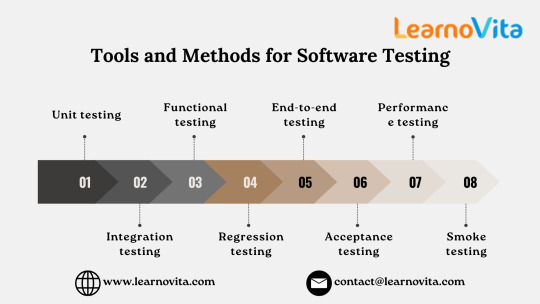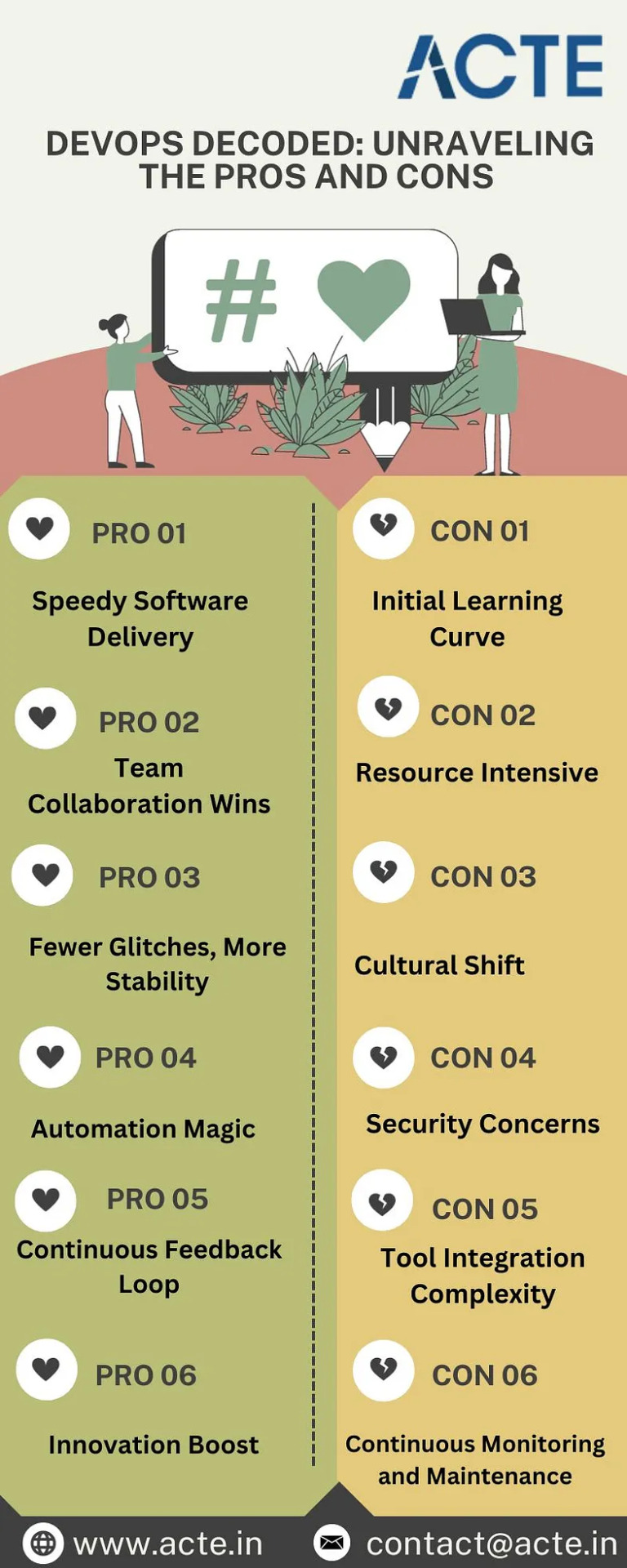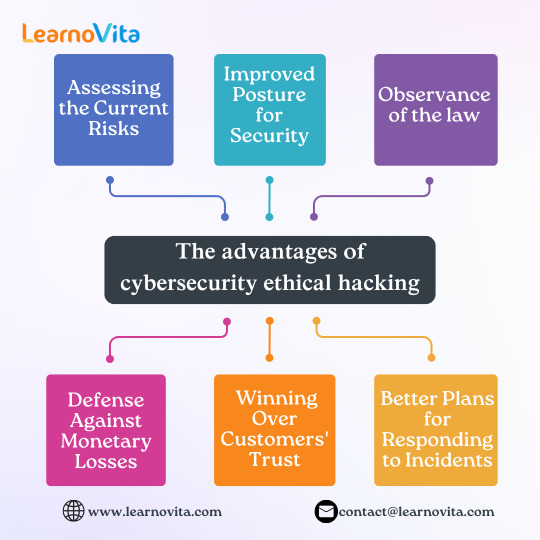#software testing course in bangalore
Explore tagged Tumblr posts
Text
Getting Started with Software Testing
Software testing is a crucial process in which a software application is evaluated to ensure it works correctly and is free from errors. This evaluation can be performed manually or with automated tools to assess both functionality and performance. As emphasized in our Software Testing Course in Bangalore, testing plays a vital role in identifying defects and ensuring the application is accurate, efficient, and user-friendly.

Key Stages of Software Testing
Software testing is typically divided into two main phases: verification and validation.
Verification involves checking whether the software meets the specified requirements and follows established standards. Activities like code reviews, static analysis, and inspections are commonly performed at this stage, often by DevOps teams. It answers the question: “Are we building the product the right way?” and contributes significantly to quality control.
Validation, on the other hand, determines whether the finished product meets business goals and user needs. Techniques like beta testing, prototyping, and goal analysis are used to validate the software. It answers: “Are we building the right product?”
Why Software Testing Matters
Testing is essential for maintaining high-quality software that performs reliably. Even minor bugs can cause major issues such as delays, user dissatisfaction, reputational damage, or financial loss.
By integrating testing throughout the development process, teams can identify issues early, ensure each feature behaves as expected, and prevent costly problems later on.
Common Software Testing Types and Techniques
Different types of testing are applied at various stages of development, including:
Unit Testing: Tests individual pieces of code (functions, methods, etc.). It’s usually automated and forms the foundation of the testing process.
Integration Testing: Ensures that different modules or services in an application work together correctly such as the interaction between the app and its database.
Functional Testing: Validates that the software meets specified business requirements by comparing expected and actual outputs. This is covered in detail in our Software Testing Online Course.

Regression Testing: Rechecks previously tested features to confirm that new code changes haven't introduced new bugs or broken existing functionality.
End-to-End Testing (System Testing): Simulates real user scenarios to test the software in a complete system environment and ensure it behaves as intended.
Acceptance Testing: Determines whether the software is ready for deployment. This includes:
Business Acceptance Testing (BAT)
User Acceptance Testing (UAT)
Performance Testing: Evaluates how the system performs under load. It includes:
Load Testing
Stress Testing
Endurance Testing
Spike Testing
Smoke Testing: A quick initial check of the basic functionality in a new build to decide if it's stable enough for further testing.
Conclusion
Software testing is a vital part of the development lifecycle. A single missed defect can impact user satisfaction and trust. By thoroughly testing software from the start, teams can ensure that applications are reliable, meet user needs, and deliver consistent performance ultimately leading to successful, high-quality products.
0 notes
Text
0 notes
Text

🐍 Master Selenium with Python! 🐍
📊 Join our Classroom & Online Selenium With Python Training in Electronic City!
✨ New Batch Alert:
📅 Date: Dec 7, 2024 ⏰ Time: 9:30 AM 💻 Mode: Classroom/Online 📍 Location: Electronic City, Bangalore
💡 What makes us different?
✅ Practical, hands-on training
✅ Expert trainers with real-world experience
✅ Job support, mock interviews, & live projects
👉 CLICK THE LINK https://www.emexotechnologies.com/ to register now and reserve your spot! 🎟️
📞 Call us at +91 9513216462 for more info.
Level up your automation skills and become a testing expert! 💪
#seleniumwithpythontraining#seleniumtesting#selenium course#pythonprogramming#python training#software testing#online learning#tech skills#certification course#emexotechnologies#bangalore#electroniccity#traininginstitute#education#learning#course#training#techeducation
0 notes
Text
Unveiling Excellence: Your Path to Success with the Best Software Testing Training in Electronic City, Bangalore

Title: Unveiling Excellence: Your Path to Success with the Best Software Testing Training in Electronic City, Bangalore
Introduction
In the fast-paced world of software development, the role of proficient software testers is more crucial than ever. As businesses rely heavily on technology, the demand for skilled individuals who can ensure the quality and reliability of software has surged. At the heart of Bangalore's tech landscape, specifically in Electronic City, emerges a standout choice for those seeking the finest software testing training – eMexo Technologies. Let's delve into how eMexo Technologies sets the benchmark for software testing training in Electronic City, Bangalore.
Why Opt for eMexo Technologies?
Tailored Curriculum for Modern Demands: eMexo Technologies prides itself on offering a curriculum that resonates with the latest trends and technologies in software testing. The modules are thoughtfully designed to bridge the gap between theoretical knowledge and practical implementation.
Exceptional Trainer Pool: The institute boasts a roster of seasoned trainers, individuals with extensive real-world experience in software testing. Their insights, anecdotes, and practical tips enrich the learning experience, giving students a taste of the actual industry scenarios.
Hands-on Learning for Skill Mastery: Recognizing that software testing is best learned through hands-on practice, eMexo Technologies integrates practical exercises, workshops, and live projects into its training programs. This approach cultivates skill mastery and prepares students for the challenges of the field.
Industry-Aligned Training: What truly distinguishes eMexo Technologies is its commitment to staying aligned with industry needs. The institute collaborates with leading tech companies to ensure that its curriculum and training methods mirror the demands of the real world.
Cutting-Edge Infrastructure: The institute's state-of-the-art facilities provide students with the perfect environment for learning and growth. Well-equipped labs and resources empower students to experiment with the latest tools and technologies.
The Student-Centric Approach
eMexo Technologies doesn't view students as mere attendees but as the driving force behind its success. The institute fosters a student-centric environment by offering personalized attention, regular assessments, and mentorship. This approach ensures that each student's strengths are nurtured and weaknesses addressed effectively.
Career Advancement and Beyond
While securing placements is a priority, eMexo Technologies goes beyond by focusing on long-term career growth. The institute aims to produce professionals who are not only job-ready but also equipped to evolve with the dynamic tech landscape. Continuous learning is encouraged to ensure that alumni remain at the forefront of software testing innovations.
The Final Verdict
In the competitive world of software testing course in Electronic City Bangalore, eMexo Technologies emerges as a beacon of excellence. Its commitment to staying abreast of industry trends, imparting practical skills, and fostering individual growth cements its status as the prime destination for software testing aspirants in Electronic City, Bangalore. Choosing eMexo Technologies isn't just a decision; it's a step toward an accomplished career in software testing.
#softwaretestingtraininginstituteinelectroniccity #softwaretraininginelectroniccity #softwaretestingcourseinelectroniccity #softwaretestingtraining #electroniccity #bangalore #emexotechnologies #softwaretestingtraininginstitute #SoftwareTesting #QualityAssurance #eMexoTech #BangaloreTech #TechCareer #education #trending #career #selenium #java #python #manualtesting #jobs #seleniumtesting #qualitytesting
#training#bangalore#electroniccity#technology#course#courses#emexo technologies#python#emexotechnologies#institute#software testing#manual testing#quality control#quality assurance#softwaretestingtraininginelectroniccity#softwaretestingcourseinelectroniccity#software testing training institute
0 notes
Text
Unveiling the Wonders of DevOps: Exploring Benefits and Challenges in Simple Language
Hello tech enthusiasts! If you've ever been curious about DevOps and desire a clear breakdown of its advantages and drawbacks, you're in for a treat. Let's dive into the marvels and obstacles of DevOps using plain and simple language from The Best Devops Training Institute in Bangalore.

The Upsides: Embracing the Magic of DevOps
1. Swift Software Delivery:
The Marvel: DevOps functions like a magician's wand, hastening the pace of software development and delivery. Updates and features roll out faster, ensuring you stay agile in the ever-evolving tech landscape. I will highly recommend the best Devops Course in Bangalore.
Why It's Fantastic: Quick updates keep you relevant and adaptable in a fast-paced digital world.
2. Team Collaboration Triumphs:
The Marvel: In the DevOps universe, developers and operations teams become dynamic partners. No more working in isolation; they team up to eliminate obstacles and ensure a seamless flow of creativity and technical expertise.
Why It's Fantastic: Team synergy fosters innovation, leading to more robust and inventive software.
3. Reduced Glitches, Enhanced Stability:
The Marvel: Similar to a flawless spell, DevOps minimizes software glitches. It's a time-saver, making your software more dependable.
Why It's Fantastic: Spending less time troubleshooting issues means more time for creating exceptional software.
4. Automation Magic:
The Marvel: Just like a magical incantation, mundane tasks can be automated with DevOps. This translates to less time devoted to routine chores and more time for imaginative and impactful work.
Why It's Fantastic: Automation liberates you from the shackles of repetitive tasks, unleashing your creative potential.
5. Continuous Feedback Loop:
The Marvel: DevOps comes with a built-in oracle, offering insights into how changes impact the software. This continuous learning loop facilitates ongoing improvements.
Why It's Fantastic: Learning from every step ensures a software evolution that continually enhances.
6. Innovation Boost:
The Marvel: DevOps doesn't just deliver software; it fosters a culture of continuous improvement and innovation. Your software stays ahead with the latest and most exciting features.
Why It's Fantastic: Embracing innovation keeps your software at the forefront of the industry.

The Downsides: Navigating the Challenges of DevOps
1. Initial Learning Curve:
The Challenge: Implementing DevOps demands a shift in mindset and practices, leading to an initially steep learning curve.
Navigating It: Invest time in training and ensure everyone is on board to ease into the new DevOps culture.
2. Resource Intensive:
The Challenge: Adopting DevOps can require significant resources, from tools to skilled personnel.
Navigating It: Plan the transition carefully, allocate resources wisely, and consider gradual implementation.
3. Cultural Shift:
The Challenge: DevOps isn't just about tools; it's a cultural shift. Resistance to change can pose a stumbling block.
Navigating It: Communicate the benefits, involve the team in decision-making, and cultivate a collaborative culture.
4. Security Concerns:
The Challenge: The speed of DevOps can raise concerns about security lapses.
Navigating It: Integrate security measures into the DevOps pipeline and prioritize continuous security testing.
5. Tool Integration Complexity:
The Challenge: Integrating different tools in the DevOps toolchain can be complex.
Navigating It: Choose tools wisely, ensure compatibility, and provide training for seamless integration.
6. Continuous Monitoring and Maintenance:
The Challenge: DevOps requires continuous monitoring and maintenance, adding an ongoing responsibility.
Navigating It: Establish robust monitoring practices and allocate resources for ongoing maintenance.
Conclusion: Navigating the DevOps Journey
In the captivating realm of DevOps, the advantages are enchanting, offering speed, collaboration, and innovation. However, like any journey, challenges are present. The key lies in understanding and addressing these challenges, embracing the cultural shift, and crafting a DevOps strategy aligned with your team's goals. So, gear up, embrace the magic, and embark on a DevOps journey that transforms the way you create and deliver software!
2 notes
·
View notes
Text
Uncodemy is one among a couple of driving organizations in Delhi, Noida, NCR, India that give undeniable preparation in Data Science, Machine learning, Python programming, Tableau, Deep Learning, and Artificial Intelligence. We at the college target producing quality experts who can withstand the developing contest and rising intricacies in the innovative world. We are growing and leading the company of Delhi, Noida, NCR, India
https://uncodemy.com/
COURSES AT UNCODEMY: A One Stop Solution to Satisfaction
Artificial Intelligence
JAVA
Machine Learning
Software Testing
Python
AWS
Data Analytics
#education#education and learning#education and training#data science#data scientist#information technology
2 notes
·
View notes
Text
Are Online Quality Assurance Testing Courses as Effective as In-Person Ones?
Introduction
As the demand for software quality continues to soar, more professionals are turning to Quality Assurance (QA) testing courses to break into or grow within the tech industry. But one question lingers for many aspiring testers: Are online quality assurance testing courses as effective as in-person ones?
This debate isn't new. With the explosion of digital learning platforms, online QA training has become increasingly accessible. However, skeptics still wonder whether the virtual environment can match the effectiveness of traditional classroom experiences. In this blog post, we'll explore both sides of the coin, comparing online and in-person QA courses based on delivery style, engagement, cost, skill development, industry relevance, and real-world application.
Whether you're a beginner looking to transition into software testing or an experienced professional aiming to upgrade your skills, this post will help you make an informed decision.
What Are Quality Assurance Testing Courses?
Quality Assurance Testing Courses are structured programs designed to equip learners with the technical and practical knowledge needed to ensure software products meet user expectations and functional requirements. These courses usually cover:
Manual Testing Fundamentals
Automated Testing Tools (e.g., Selenium, TestComplete)
Software Development Life Cycle (SDLC)
Testing Frameworks and Methodologies (e.g., Agile, Waterfall)
Bug Tracking Tools (e.g., Jira, Bugzilla)
Test Case Writing and Execution
Quality Metrics and Reporting
With QA playing such a critical role in software development, choosing the right course format—online or in-person—can significantly affect how well learners grasp these topics.
Online QA Testing Courses: The Rise of Flexibility
Benefits of Online QA Training
Flexibility and Convenience Online QA testing courses offer unparalleled flexibility. Learners can access modules anytime, making them ideal for working professionals, parents, or anyone juggling multiple responsibilities.
Self-Paced Learning Online platforms often offer self-paced courses, allowing learners to progress at a comfortable speed. This benefits students who need extra time on complex topics or want to skip through basics they already know.
Global Access to Expert Trainers Geographic location is no longer a barrier. A student in Ohio can learn from a QA expert based in Silicon Valley or Bangalore, without leaving home.
Cost-Effectiveness Online courses tend to be more affordable than in-person ones. They eliminate expenses like commuting, housing, and printed materials.
Repeat and Replay Options Many online QA courses allow learners to revisit recorded sessions, which helps reinforce learning and improve retention.
Technology Integration Online platforms often use screen-sharing, virtual labs, simulators, and interactive quizzes to enhance the learning experience.
In-Person QA Testing Courses: The Traditional Advantage
Strengths of Classroom-Based Training
Immediate Interaction and Feedback Classroom settings allow real-time interaction with instructors and peers. Questions can be answered on the spot, and group discussions often lead to a deeper understanding.
Structured Environment In-person courses provide a disciplined learning atmosphere, which can be beneficial for those who struggle with motivation or procrastination.
Hands-On Practice in Labs Physical labs and supervised testing environments offer hands-on practice, especially with tools like Selenium or LoadRunner, under expert guidance.
Networking Opportunities Face-to-face classes foster professional connections, allowing students to network with instructors and peers, which can lead to job referrals or collaboration opportunities.
Customized Learning Experience Instructors can tailor lessons based on class progress and provide personalized mentoring that may not be possible in a pre-recorded online course.
Key Comparison Areas: Online vs. In-Person QA Courses
1. Engagement and Motivation
Online: While online forums, chat rooms, and live webinars are engaging, some learners may find it harder to stay motivated in a solo learning environment.
In-Person: Peer presence and scheduled sessions keep students more accountable and engaged.
2. Quality of Instruction
Online: Top platforms recruit experienced instructors and offer high-quality pre-recorded or live sessions, often enhanced with multimedia tools.
In-Person: Instruction may vary based on geography and institution, but face-to-face interaction generally improves communication and personalized feedback.
3. Real-World Project Exposure
Online: Many online QA programs now incorporate capstone projects, live case studies, and tool-based simulations to mimic real-world testing scenarios.
In-Person: Physical training sessions might include team projects and live testing environments, which provide direct industry simulation.
4. Skill Mastery
Online: Self-driven learners often excel with online tools, especially if the course includes virtual labs and assessments.
In-Person: Real-time problem-solving and instructor-led practice often ensure strong skill development and immediate correction of mistakes.
5. Accessibility
Online: Learning from any part of the world is possible, and it's ideal for those in remote locations or with mobility challenges.
In-Person: Access is limited by physical proximity and scheduling constraints.
6. Cost and ROI
Online: Lower upfront costs and the flexibility to learn while working result in a high return on investment.
In-Person: May involve more financial commitment, but potentially faster course completion and stronger immediate placement support.
Student Experience and Industry Trends
What Do Learners Say?
Surveys from tech education platforms and training institutes indicate that over 80% of students enrolled in online QA testing courses feel they gained sufficient skills to enter the job market. However, around 60% also admitted needing additional practice or mentoring after course completion.
On the flip side, students in in-person QA courses report higher satisfaction with peer collaboration and instructor support. But they also point out that rigid schedules and commutes can be limiting, especially for those balancing jobs or families.
What Does the Industry Say?
According to a 2024 report by Global Market Insights, the eLearning market in IT and software training is expected to surpass $450 billion by 2026, driven by rising demand for cloud-based platforms and flexible learning.
Additionally, many tech companies now recognize online certifications and projects as credible credentials when hiring. Employers are more interested in demonstrable skills than in where or how those skills were learned.
Blended Learning: The Best of Both Worlds?
Some institutions now offer blended QA courses that combine the convenience of online lectures with optional in-person lab sessions or virtual group projects. These hybrid models aim to merge:
Online flexibility
Hands-on practice
Live instructor support
Peer collaboration
This method is particularly effective for QA training, which requires both theoretical understanding and tool-based execution.
Final Verdict: Are Online QA Courses Effective?
The short answer? Yes, if you choose the right program and stay committed.
While in-person courses offer valuable face-to-face guidance and community, modern online QA courses, especially those offering live projects, practical tool training, and placement support, can be equally effective.
Success in either format depends more on:
The quality of the curriculum
Your learning style and discipline
Access to industry-relevant tools
Mentorship and practice opportunities
For many learners, online QA courses offer the scalability, affordability, and accessibility needed to kickstart or enhance a career in software testing.
Key Takeaways
Online QA testing courses are flexible, affordable, and globally accessible, making them ideal for working professionals or career changers.
In-person QA courses offer real-time interaction, structured discipline, and strong networking opportunities, but may be less accessible and more costly.
Skill development, project work, and instructor support are critical, regardless of the learning format.
Choosing a course that offers practical training, capstone projects, and placement support is more important than the mode of delivery.
Blended or hybrid models can provide the best mix of both formats for optimal learning and career success.
Ready to Begin Your QA Testing Journey?
Whether you prefer the flexibility of online classes or the structure of in-person training, Quality Assurance testing is a future-proof career path filled with opportunity.
Choose a course that suits your lifestyle, learning preferences, and long-term career goals, and start building your expertise in ensuring software quality today.
0 notes
Text
The Role of Ethical Hacking in Preventing Cyberattacks
As cyberthreats change, ethical hacking has become essential to thorough security measures in many businesses. Through bug bounty programs, companies such as Google and Facebook aggressively use ethical hackers to find vulnerabilities in their systems. The proactive approach of ethical hacking promotes a security-conscious culture within businesses and helps avoid expensive data breaches. To safeguard sensitive data, ethical hackers continuously evaluate and enhance security protocols in our Ethical Hacking Course in Bangalore.

What Ethical Hacking Means
"Ethical hacking" refers to techniques that are permissible for identifying vulnerabilities in systems, networks, and applications. In the late 1990s, this discipline began to gain traction as companies realized they needed to implement proactive security measures. By employing the same methods as authorized hostile hackers, ethical hackers also referred to as "white-hat" hackers improve security.
Ethical hacking has a promising future. Ethical hackers will use increasingly sophisticated techniques to identify vulnerabilities as AI and machine learning proliferate. As cyberthreats continue to rise, it will become increasingly important for businesses to hire ethical hackers who can stop these attacks.
The benefits of ethical hacking in cybersecurity
1. Evaluating the Present Dangers
System vulnerabilities are found via ethical hacking before malevolent hackers may take use of them. The likelihood of expensive data breaches is greatly decreased by this proactive strategy. By fixing vulnerabilities with penetration testing tools like Metasploit or Burp Suite, businesses can save a significant amount of money.
2. Better Security Posture
Regular ethical hacking assessments strengthen a company's overall security posture. With the assistance of knowledgeable ethical hackers, organizations can conduct red team exercises that mimic real attacks. Organizations can increase their resistance to changing cyberthreats by routinely testing and fortifying security measures. Effective protections against such threats are maintained by this ongoing upgrade.
3. Respect for the law
Businesses can utilize ethical hacking to comply with regulations like GDPR and HIPAA. Businesses may stay out of trouble and safeguard their reputation by adhering to these rules. Compliance demonstrates a commitment to protecting confidential data and maintaining customer trust. Our Software Training Institute needs ethical hacking testing on a regular basis to find security vulnerabilities and guarantee compliance.

4. Protection Against Financial Losses
Data breaches can cost organizations millions of dollars in lost revenue and recovery expenses. Ethical hacking raises awareness of vulnerabilities by identifying and fixing them before attackers may exploit them. This preventive measure ultimately protects the organization's financial stability.
5. Gaining the Trust of Customers
Customer loyalty and trust are increased when ethical hacking is used to demonstrate a commitment to cybersecurity. Customers are more likely to engage with businesses who secure their data proactively. Regular security audits must be encouraged in order to reassure clients that their data is safe. Building a reputation for reliability and accountability also includes managing sensitive data.
6. Improved Incident Response Plans
Ethical hacking allows companies to assess their incident response plans by mimicking real attacks. This practice helps identify weaknesses in reaction strategy. It also assists businesses in strengthening their processes to make them more resilient to threats.
Conclusion
The role that ethical hackers play in protecting digital assets cannot be overstated. The cyber security network that strengthens an organization's cyber security policies and creates new ways to improve them depends on them. If you want to be sure that you will have a lot of possibilities after you graduate, you must earn this degree from an accredited university. There are currently several different cyber security certification programs available. However, nothing compares to a degree program for expanding your knowledge and skill set. Do the necessary research and pick a school that can provide you with thorough cyber security training. The future is bright for professionals who possess the necessary education and experience in this field.
1 note
·
View note
Text
Full Stack Development Course: Roadmap, Skills, and Job Opportunities
In today's digital era, businesses are constantly seeking tech professionals who can build and manage complete web applications independently. This is where Full Stack Development shines. With the demand for full stack developers on the rise, now is the perfect time to enroll in a Full Stack Development Course and kickstart a career in one of the most versatile roles in the IT industry.
If you're looking for the best place to learn, Be-Practical, an educational and training organization based in Bangalore, offers a comprehensive full stack developer course in Bangalore that combines industry-relevant skills with practical learning and guaranteed placement support.
In this blog, we’ll explore the roadmap to becoming a full stack developer, the key skills you’ll gain, and the job opportunities available after completing a full stack development course in Bangalore.

📍 What is Full Stack Development?
Full stack development refers to the process of developing both the front-end (client side) and back-end (server side) of web applications. A Full Stack Developer is a professional capable of handling the entire application development process—from user interface design to server and database management.
Given the dynamic nature of web technologies, companies prefer hiring full stack developers who can manage end-to-end projects with minimal dependency.
🎓 Why Choose Be-Practical?
Be-Practical is a trusted name in IT education and training, especially in the domain of full stack development course in Bangalore. With an emphasis on hands-on learning, real-time projects, and industry mentorship, Be-Practical prepares students to meet real-world development challenges head-on.
Their full stack developer course in Bangalore with placement offers dedicated career guidance, resume building sessions, and mock interviews to ensure you're fully prepared to land your dream job.
🛣️ Full Stack Development Course Roadmap
A well-structured Full Stack Development Course is typically divided into three main layers:
1. Front-End Development
You’ll begin by learning how to build user interfaces using:
HTML5 & CSS3 – For structuring and styling web content.
JavaScript – The programming language that powers interactivity.
React.js or Angular – For building responsive, single-page applications (SPAs).
The full stack developer course at Be-Practical ensures you master these tools to design seamless, responsive websites that provide a rich user experience.
2. Back-End Development
Next, you’ll explore the server side of web development, including:
Node.js & Express.js – Popular technologies for building scalable server-side applications.
Java or Python (optional) – Additional languages used by many enterprise-grade applications.
REST APIs – For client-server communication.
The full stack development course in Bangalore by Be-Practical offers practical training in server-side logic, database integration, and session handling.
3. Database Management
Databases are crucial for any application. You’ll learn how to:
Design and manage SQL databases (MySQL, PostgreSQL)
Work with NoSQL databases like MongoDB
Integrate databases with front-end and back-end using full stack frameworks
4. DevOps & Deployment
Be-Practical’s full stack developer course in Bangalore with placement also covers deployment fundamentals:
Version control with Git & GitHub
Hosting applications using Heroku, Netlify, or AWS
Introduction to CI/CD pipelines and cloud environments
This makes you job-ready and confident in deploying real-world projects to live environments.
🧠 Essential Skills You’ll Learn
By the end of your Full Stack Development Course, you’ll have hands-on experience with the following:
Writing clean, efficient HTML, CSS, and JavaScript code
Creating dynamic front-end applications with React
Building scalable back-end APIs using Node.js and Express
Managing relational and non-relational databases
Using Git and GitHub for version control and collaboration
Deploying full stack projects in cloud environments
Debugging and testing applications
Soft skills like communication, teamwork, and problem-solving
These skills are taught through project-based learning at Be-Practical, ensuring you apply everything you learn in real-time scenarios.
💼 Career and Job Opportunities
The demand for full stack developers is booming across India and globally. After completing a full stack developer course, you can explore roles such as:
Full Stack Developer
Web Developer
Front-End Developer
Back-End Developer
Software Engineer
UI/UX Developer
Application Developer
Top tech companies, startups, and MNCs are actively hiring professionals who can manage entire application life cycles. According to job market reports, full stack developers in India earn between ₹4 LPA to ₹15 LPA based on experience and skill level.
Be-Practical’s full stack developer course in Bangalore with placement ensures you don’t just learn the skills—you get placed in the right job with the right package.
📍 Why a Full Stack Developer Course in Bangalore?
Bangalore is India’s tech hub, home to thousands of IT companies, startups, and R&D centers. Choosing a full stack development course in Bangalore puts you in proximity to top employers and opens up numerous networking and internship opportunities.
Be-Practical’s industry partnerships and local employer connections make it one of the best places to take a full stack developer course in Bangalore and get placed quickly.
🎯 Final Thoughts
Whether you’re a student, a working professional looking for a career switch, or someone seeking a high-paying job in IT, a Full Stack Development Course is your ticket to long-term success.
Be-Practical offers one of the most comprehensive and job-focused full stack developer course in Bangalore with placement, equipping you with technical skills, soft skills, and industry exposure.
Start your journey today with Be-Practical and become a confident, competent full stack developer ready to take on the digital world.
0 notes
Text

🚀 Ready to Become a Full Stack Testing Pro? 🚀
🖥️ Join us for an exclusive Full Stack Software Testing Training at eMexo Technologies on 21st NOV at 10:00 AM! Get hands-on experience with the latest tools and techniques for testing. Plus, we’re giving you a MASSIVE 30% OFF to kickstart your journey into the tech world! 💥
⏳ Limited Seats – Don't miss out on this career-boosting opportunity! 💼
CLICK THE LINK https://www.emexotechnologies.com/ to reserve your spot NOW! 💻👨💻
📅 NOV 21, 2024 🧭 10.00 AM ( IST )
Format: Classroom & Online Training
For more info call us:
📞 +91 9513216462
#emexotechnologies#bangalore#electroniccity#traininginstitute#education#learning#course#training#careers#techeducation#certificationcourse#software testing#learn to code#it training institute
0 notes
Text
Software Testing in Bangalore
Looking to start a career in Software? Join our Software Testing course in Bangalore and gain hands-on experience with manual and automation testing tools. Learn from industry experts and become job-ready. Enrol now to boost your software testing skills!
0 notes
Text
Top UI/UX Design Institutes in India with Placement Support
In today’s digital-first world, your first impression often happens through a screen. Whether you're navigating a mobile app or browsing a website, how it looks and feels plays a huge role. That’s where UI/UX designers step in—blending creativity with usability to build better experiences.

If you're planning a career in this exciting space, your learning journey matters. Not only do you need strong design skills, but you also need the right platform that supports your growth. That’s why choosing from the Top UI/UX Design courses in India—especially those with placement support—is so important.
Let’s explore your best options.
Why UI/UX Design Is Worth Learning Today
To begin with, UI/UX design is no longer a niche skill. In fact, companies across industries—from e-commerce and fintech to education and health—need professionals who understand user behavior and design clean, functional interfaces.
Moreover, the demand is growing. As more businesses go digital, the need for designers with UI and UX expertise has skyrocketed. Even better, salaries in this field are attractive, and growth opportunities are abundant. Whether you're a student or a working professional, learning UI/UX can open the door to exciting career paths.
What Makes a Good UI/UX Design Course?
Before you choose an institute, it’s worth asking: what makes a course truly effective?
First, the curriculum should be up to date. It should cover tools like Figma, Adobe XD, and Sketch. Additionally, a strong course should include practical assignments, hands-on projects, and portfolio-building support.
Furthermore, placement support is a major plus. A course that helps you land a job—or even prepares you for interviews—adds real value.
Now that we know what to look for, let’s dive into the top institutes in India that offer quality education with job assistance.
🏆 Top UI/UX Design Institutes in India with Placement Support
1. Inframe Design School – Jodhpur
To start with, Inframe Design School is a leading choice for anyone seeking a comprehensive UI/UX education. The course is ideal for beginners as well as professionals looking to switch careers.
Why it stands out:
100% placement assistance
Real-time tools like Figma, Webflow, and Adobe XD
Experienced mentors from the industry
Live projects and case studies
Online and offline options available
✨ Best for: Students who want a job-ready, project-based UI/UX course 📍 Location: Jodhpur, with online classes available
2. Designerrs Academy – Delhi, Mumbai, Bangalore
Designerrs has made a name for itself with its user-centric approach. Not only do they focus on design tools, but they also dive deep into UX research, user flows, and prototyping.
Key features include:
Live mentorship and career guidance
Design thinking and usability testing
Mock interviews and recruiter connections
🧩 Best for: Learners who want mentorship and an offline classroom experience
3. ImaginXP – Nationwide + Online
ImaginXP is known for offering university-certified UI/UX design courses in collaboration with colleges across India. In addition to technical training, they emphasize future tech skills like AI in design and design for AR/VR.
Program highlights:
University-level certifications
Curriculum aligned with industry needs
Internship opportunities and placement help
📘 Best for: Students looking for academic certification and structured learning
4. MAAC – UI/UX Design Program
Although MAAC is primarily known for animation and multimedia, it now offers a UI/UX design course that’s gaining popularity.
Why consider MAAC?
Hands-on software training
Portfolio development
Offline batches in many Indian cities
Job assistance through creative placement cells
🎯 Best for: Students who prefer in-person training and creative environments
5. FITA Academy – Chennai, Bangalore, Coimbatore
FITA’s UI/UX design course is designed for both beginners and career changers. Not only does it cover the basics, but it also trains you in user psychology and interface wireframing.
Why FITA works:
Project-based learning
Strong focus on usability testing
Good industry tie-ups for placement
🎨 Best for: Working professionals who want weekend or fast-track options
What Will You Learn in a UI/UX Course?
A well-rounded UI/UX design course usually includes:
Visual Design Principles (colors, fonts, spacing)
UX Research Methods (interviews, personas, journey maps)
Prototyping Tools like Figma and Sketch
User Testing and Feedback Collection
Building a Portfolio Website
In addition, many top courses also include soft skills like communication, team collaboration, and design presentations. These are crucial when you start working in real teams.
Career Options After UI/UX Course Completion
Once you complete one of the Top UI/UX Design courses in India, you’re ready to apply for roles such as:
UI Designer
UX Designer
Product Designer
User Researcher
Interaction Designer
Visual Designer
On top of that, if your institute offers mock interviews, resume workshops, or placement drives, you’re already one step ahead of the competition.
Final Thoughts
To sum it up, learning UI/UX design is one of the smartest moves you can make in 2025. The digital world is growing fast, and the need for skilled designers is growing with it.
While there are many courses out there, the best ones don’t just teach you tools—they prepare you for a real job. That’s why enrolling in one of the Top UI/UX Design courses in India that includes placement support is a smart and strategic decision.
If you're ready to take the leap, explore your options, compare what each course offers, and choose what fits your career goals.
Thanks For Sharing
0 notes
Text
Best Software Testing Course in Bangalore
Kickstart Your Career with the Best Software Testing Course in Bangalore at Upshot Technologies

#SoftwareTestingCourse#UpshotTechnologies#SoftwareTestingTraining#TestingJobsBangalore#AutomationTesting#ManualTesting#SeleniumTraining#CareerInTesting#BangaloreTrainingInstitute#ITCoursesBangalore#JobOrientedCourses#UpskillWithUpshot#JoinNow#EnrollToday
0 notes
Text
NUCOT – Empowering IT Careers with Skills, Confidence & Opportunity

Nucot-Software Training and Placement Company
In today’s fast-evolving digital economy, having technical skills is only one part of the equation. What truly matters is industry-relevant training, practical experience, and job-ready confidence—and that’s exactly what NUCOT stands for. As a trusted name in IT training and staffing, NUCOT (Nuage Compusys Technologies Pvt. Ltd.) has become a bridge between aspiring professionals and the tech industry.
💼 Who We Are
Founded in 2010 and headquartered in Bangalore, NUCOT has grown into a reputable brand in the fields of IT training, career transformation, and staffing solutions. Over the past decade, we've helped thousands of students and job seekers transition into meaningful roles in top tech companies.
Our brand is built on trust, expertise, and results. We are not just a training institute; we are a career partner. From training to placement, NUCOT supports every step of the journey.
🎯 What Makes NUCOT Unique?
1. Industry-Aligned Training
Our training programs are designed by professionals who understand what companies expect from candidates. We offer hands-on training in:
Data Science with Python
Artificial Intelligence & Machine Learning
Deep Learning
Manual & Automation Testing
Core Java & Advanced Java
Each program includes live sessions, real-world projects, and mock interviews, ensuring students are not just learning — they’re getting ready for the real world.
2. 100% Placement Assistance
NUCOT has earned a reputation for delivering on its placement promise. We provide:
Resume building support
Mock interviews with HR and technical experts
Job referrals to top companies like HP, IBM, Accenture, Mphasis, and Unisys
Our strong ties with the IT industry mean students are not left on their own after training—we walk the path with them until they’re hired.
3. Experienced Mentors
The heart of NUCOT’s brand lies in its dedicated trainers. Experts like Hemavathi, Karunya, and others bring years of industry experience and a passion for teaching. They offer:
Personalized attention
Daily follow-ups
Live problem-solving This mentorship helps students overcome their doubts and grow in confidence.
4. Flexible Learning Modes
We understand that every learner is different. That’s why NUCOT offers:
Online training for remote learners
Classroom training at our Bangalore centre
Weekend and weekday batches for working professionals and students alike
This flexibility allows students to learn on their own terms without compromising quality.
🏆 NUCOT’s Brand Promise
At NUCOT, our brand is built around one simple promise: “Get Trained. Get Certified. Get Hired.”
This isn’t just a tagline—it’s a commitment. We don’t just provide knowledge; we build careers. Every learner is treated as a long-term partner, and we invest in their growth until they achieve success.
💬 What Our Learners Say
“NUCOT helped me shift from a non-IT background to a full-time role in a reputed MNC. The trainers were extremely supportive and the placement support was genuine and effective.” – Priya S., Data Science Trainee
“I had zero knowledge of testing tools when I joined. Today, I am working as a QA Analyst in Bangalore. Thanks to NUCOT for making it possible!” – Ravi K., Software Testing Graduate
🌐 Our Brand Footprint
NUCOT has trained students from across India and abroad. With an increasing online presence, we’re expanding our reach to students from:
Karnataka, Tamil Nadu, Andhra Pradesh, Telangana
Maharashtra, Gujarat, Delhi NCR, and beyond
Our alumni work in top organizations, and their success stories are the strongest representation of what NUCOT stands for.
📈 Looking Ahead
As we move forward, NUCOT is committed to:
Introducing new-age courses in AI, cloud, DevOps, and cybersecurity
Building global collaborations for certifications and internship opportunities
Expanding our placement partnerships with more companies in India and overseas
🔚 Conclusion: Why Choose NUCOT?
NUCOT isn’t just another IT training company—it’s a brand built on transformation. We understand what companies want, what students need, and how to bridge that gap with skill, strategy, and sincerity.
If you’re looking to launch or shift your career in IT, there’s no better place to start than NUCOT. Our training is focused, our mentors are experienced, and our results speak for themselves.
0 notes
Text
0 notes